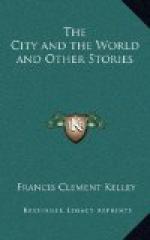Now, O God! there were the red men, the brown men, the yellow men and the black men; not to speak of these white men whose faces were so strange; and they were going to say something—something against him. He could guess—could well guess what it was they would say. The Vicar-General knew that he had been wrong, and that his wrong had come into Eternity. He doubted if it ever could be made right, for he knew now the value of a soul even in a black body. He knew it, but was it too late? His vestments were as heavy as lead.
Trembling in every limb, the Vicar-General looked for his Judge; but he could not see Him. He only felt His Presence. The Silent Angel had a book in his hand. The Vicar-General could read its title. There was a chalice on the cover, as if it spoke of priests, and under it he read:
The law by which they shall be judged.
The Silent Angel opened the book and the Vicar-General saw that it had but one page. Shining out from the page he read:
“Thou art A priest forever.”
And under it:
“Go ye, therefore, and teach all Nations.”
Sorrow was over the soul of the priest. Only the hope in the eyes of the Silent Angel gave him hope, as he bowed his head before the judgment.
THE RESURRECTION OF ALTA
Father Broidy rushed down the stone steps and ran toward the Bishop’s carriage which had just stopped at the curb. He flung open the door before the driver could alight, kissed the ring on the hand extended him, helped its owner out and with a beaming face led the Bishop to the pretty and comfortable rectory.
“Welcome! welcome to Alta, Bishop,” he said as they entered the house, “and sure the whole Deanery is here to back it up.”
The Bishop smiled as the clergy trooped down the stairs echoing the greeting. The Bishop knew them all, and he was happy, for well was he aware that every man meant what he said. No one really ever admired the Bishop, but all loved him, and each had a private reason of his own for it that he never confided to anyone save his nearest crony. They were all here now to witness the resurrection of Alta—the poorest parish in a not too rich Diocese, hopeless three years ago, but now—well, there it is across the lot, that symphony in stone, every line of its chaste gothic a “Te Deum” that even an agnostic could understand and appreciate; every bit of carving the paragraph of a sermon that passers-by, perforce, must hear. To-day it is to be consecrated, the cap-stone is to be set on Father Broidy’s Arch of Triumph and the real life of Alta parish to begin.
“I thought you had but sixteen families here,” said the Bishop as he watched the crowd stream into the church.
“There were but eighteen, Bishop,” the young priest answered, with a happy smile that had considerable self-satisfaction in it. “There are seventy-five now.”




